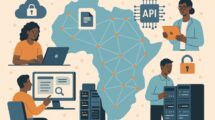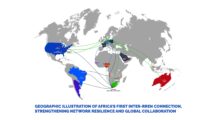Words: Yasmeen AlKouz, ASREN
Equality is a necessary foundation for a peaceful, prosperous and sustainable world. Gender equality and female empowerment are not just basic human rights; they are also catalysts for development in all areas. Providing women with equal access to education, health care, decent work, and representation in political and economic decision-making processes is fundamental for social cohesion and prosperity.
To achieve gender equality in Africa, the National Research and Education Networks (NRENs) have been carrying out women empowerment initiatives with a focus on ICT and STEM.
African women are still a minority in the research field and science academics. However, there has been significant progress in the field in comparison to other world’s regions, such as sub-Saharan Africa, which counts a 33% share of female researchers in all subject areas, while in North Africa, Tunisia is the first country in Africa with a 55% share of female researchers.
Information and Communication Technologies (ICTs) enable women to play an active role in community development and in turn bridge the so-called gender digital divide. By giving girls and young women ICT education and the confidence to pursue ICT studies and careers and gaining access to attractive roles, NRENs and RRENs are helping women become economically sound, which is a source of other types of women empowerments. An example of that is the ICT4Girls Hackathon for young girls run by Eko-Konnect in Nigeria and the Women-in-WACREN program run by the regional research and education network WACREN providing courses and workshops in ICT to over 2000 young women in Western Africa giving them a jump-start for their career.
Women are now more than ever making their way into leadership and other technical roles within African NRENs. For example, the national networks in Algeria, Tunisia, Madagascar, and Zimbabwe have women at their helms. Likewise, the national networks in Ghana and Benin have employed women in leadership positions within the organisations.
Furthermore, several NRENs and their member institutions have provided equal opportunities to their personnel and students beyond the field of ICT. Through dedicated and focused training and mentorship programs, they have been addressing the existing gender inequalities and worked to improve the opportunities available to women. An example of this was SANReN in South Africa and the University of Uganda, which have been running gender equality awareness training. Meanwhile, the University of Rwanda has been running mentorship programs and training for young girls. Furthermore, through its Center for Gender Studies (CGS), the University of Rwanda supports the government’s gender equality objectives.
By adopting policies and joining initiatives that promote gender equality in the public sector, organisations ensure that scholarships are assigned equally to women and men, female students receive child support if needed, and that student mentorship is available equally to both genders. In 2022, Makerere University in Uganda, a member of the Research and Education Network for Uganda, became the first public sector institution in the country to enrol in the United Nations Development Programme’s Gender Equality Seal Initiative, designed to promote accountability for gender equality and women’s empowerment in public sector institutions.
African RENs are also making efforts in collaboration with the AfricaConnect3 Project to highlight the achievements and successes of their women in STEM by giving them more visibility in a series of online interviews and blogs on International Women’s Day. Other member institutions are celebrating and recognizing progress and innovations made by women and girls in engineering and technology through organizing dedicated events – similar to the Harare Institute of Technology (HIT) in Zimbabwe hosting the Women in Technology Event on International Women’s Day. HIT has also been collaborating with Wikipedia to improve the visibility of women under the Wiki Loves Women initiative. HIT is a member of the Zimbabwe Research and Education Network and gains from this.
Although gender equality and women’s empowerment have advanced in recent decades, there is still a lot of mileage to go. African NRENs are increasingly making gender equality central to their work by adopting policies, developing activities, and implementing initiatives, to advance women’s empowerment within their workplaces and communities.





